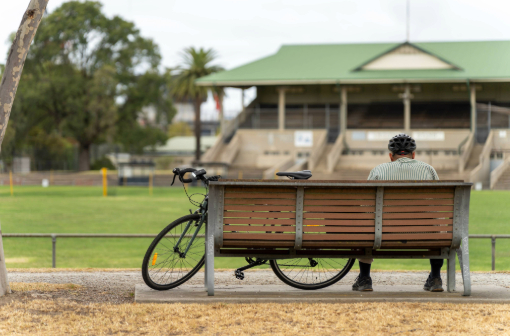“If you're not feeling connected to your workplace, it's important to look within your inner circle of friends and family, and your local community.” – Dr Michelle Lim.
Key points
- More Australians are working from home than ever before.
- The downside of this is that more people are suffering from loneliness.
- The Australian Unity Wellbeing Index shows that social connectedness with work colleagues correlates with higher levels of wellbeing.
For many Australians, the concept of working from home has long sounded like a godsend. After all, you get the luxury of a sleep-in as you save precious time on the daily commute; you can work in your trackpants; you can work autonomously out of view of the boss and out of earshot of ringing phones; and you have more opportunity to indulge your recreational pursuits and spend time with your family and friends.
But for an increasing number of remote workers and freelancers, the novelty soon wears off as they try to cope with the maddening silence, the social disconnection and potentially lethal loneliness.
The way to ease the problem, the experts say, is to gain a greater understanding of loneliness and its wide-ranging impacts, along with the issues faced by those working from home.

Loneliness and your wellbeing
Over the past decade – well before remote-worker numbers exploded worldwide out of necessity during the COVID-19 pandemic – there has been an increasing shift towards remote working as businesses adopt more flexible work arrangements and people embrace the freelancer lifestyle. There is also growing evidence that greater numbers of Australian workers are suffering from loneliness.
Australian Unity, in conjunction with Deakin University, has been measuring the wellbeing of Australians for 20 years as part of the Australian Unity Wellbeing Index. The Wellbeing Index’s 2020 report, “Social Connectedness and Wellbeing”, found there was an 8 percent spike in the number of people experiencing loneliness between 2013 and 2019 – rising from 24.79 percent to 33.04 percent.
The report also found that, while loneliness touches everyone to some degree, your age, marital and employment status, and where you live all have an impact on how lonely you may feel. The report reinforced that social connectedness with work colleagues correlates with higher levels of wellbeing, and that loneliness levels fell as income increased.
It's important to make the distinction between social isolation and loneliness: we shouldn’t presume that a person who lives alone and works at home is lonely, or that a remote worker boasting a loving family and busy social life must have all the social connection they need. Like many conditions, loneliness doesn't discriminate – and it can vary considerably in severity, from mild to debilitating. So, what does this mean for those of us who are working from home?

Health, social connection and more: the impact of loneliness
While an increasing number of people were already working from home, the outbreak of COVID-19 in 2020 forced a third of Australian workers to transition to remote working – and rapidly. But while some people reacted with glee to the prospect of working in their pyjamas, for others the move was met with dread.
“The impact of working remotely can be mixed – some find it positive, some negative, and many people find it's a mixed bag,” says Dr Jeannie Yoo, Clinical Director at Remedy Healthcare, Australian Unity’s health partner.
“It's harder for remote workers to develop strong social connections, particularly if in person is the only way you've ever interacted with your colleagues; and it's harder to connect when you don't have those incidental interactions that happen naturally in a workplace. It's about the quality of relationships. You can be connected to people via technology but you can still feel lonely if you don't have a genuine sense of human connection.”
Dr Michelle Lim, the scientific chair of Ending Loneliness Together and senior lecturer in clinical psychology at Swinburne University of Technology, offers this advice: “If you're not feeling connected to your workplace, it's important to look within your inner circle of friends and family, and your local community. And be selective. A lot of people speak to their partners about work issues, but your partner might be the worst person to speak to, whereas a friend might be ideal.”
Michelle goes on to add: “The impact of loneliness is wider than the workplace because lonely people utilise health services more, they're sick more often, if they get injured they recover a lot slower because their bodies are under more stress. So if an employee is lonely and their vulnerability is increased by remote working, then something needs to be done.”
Loneliness red flags
Working from home is not without its challenges. For some, it means longer hours and a feeling that work has disrupted or invaded the home sanctuary, with many feeling they can’t “log off”.
“The most common problem I'm hearing is, ‘I'm exhausted and I'm not feeling connected’. Some mightn’t say ‘I'm lonely’ but they will say ‘I feel isolated’, ‘I feel out of sorts’ or ‘I can't be bothered going outside’, which indicates a low level of engagement and is a huge red flag," says Eliza Oakley, a counsellor and workplace mental health consultant. "If it’s ongoing and it's preventing you from functioning properly – whether it’s for work, or keeping up with social supports or even going for a walk – then you need support. Preferably you'd reach out well before the situation became dire.”
Jeannie adds: "Loneliness is part of the human condition. We need to understand it could be us, and we'd appreciate it if somebody else was looking out for us. It’s our responsibility to recognise people we know who might be socially isolated and perhaps more vulnerable and make a conscious effort to connect regularly with them.”

Combatting loneliness
“What the focus on loneliness reflects is that more and more we are recognising that there are many aspects to wellbeing and that we can't think of them as completely separate from each other. There's physical, mental, social, emotional, cultural and spiritual aspects that need to be present and in balance for each of us to feel comfortable and happy,” says Jeannie.
Getting on top of a growing loneliness epidemic isn’t easy, and a remote worker's predicament can depend largely on the level of support provided by their employer or support network. Whether you’re employed by someone else, or running your own show, it’s good practice to implement working-from-home policies that help you maintain regular contact and develop meaningful connections. For organisations, you may need to tailor your approach to safeguard potentially vulnerable individuals.
Here‘s what the experts suggest to help combat loneliness while working from home:
- Establishing formalised, regular check-ins with your employees, perhaps early and late in the day, and making contact at other times as required. For those working for themselves, checking in with a friend or peer on a regular basis can help.
- Asking employees: "What support do you need to make working remotely a success?"
- Discouraging staff from working beyond their standard hours unless absolutely necessary. People are known to cope with loneliness by overworking.
- Giving people time to get away from their screens to recharge. A strong sense of wellbeing is linked to physical activity and community connectedness, so getting away from your desk to go for a walk or call a friend can help.
- Considering the most appropriate form of communication for each circumstance. Emails and other messaging services are often the most practical, but phone or video calls can provide a more personal touch. As Eliza points out: “People can seem fine on email or text but when you speak to them, they sound like they're struggling. Often when someone is lonely, the connection that’s missing is their connection with others, and a phone call can be a life saver.”
- Creating opportunities for employees to connect socially online in a relaxed environment. Asking them for ideas.
- Alerting staff to any free, confidential support services provided by the business.
"It's about making sure someone has got your back. If that culture is created, it will be better for the person concerned, less stress for the manager and better for the organisation," says Michelle.
Eliza adds: "Workplaces need to provide support and so do we as individuals. Your remote working day needs to include self-care."
There’s no need to suffer loneliness in silence – reaching out to your employer, colleagues, your network, or family and friends can help prevent feelings of disconnection from seeping into your life.
Disclaimer: Information provided in this article is of a general nature. Australian Unity accepts no responsibility for the accuracy of any of the opinions, advice, representations or information contained in this publication. Readers should rely on their own advice and enquiries in making decisions affecting their own health, wellbeing or interest.



